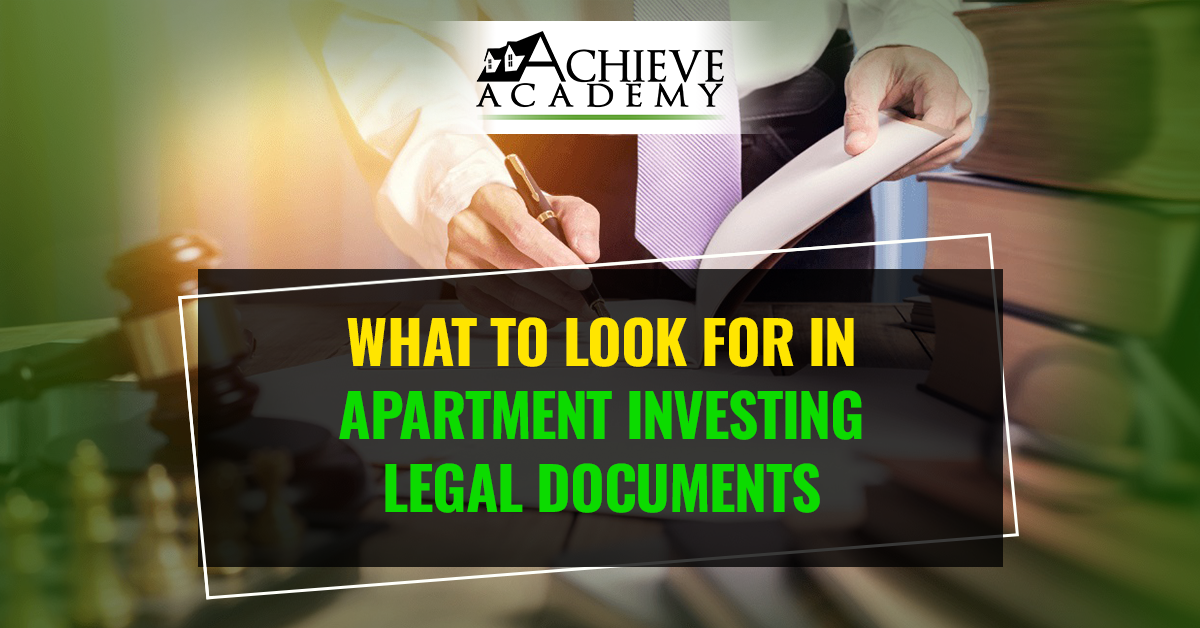
Apartment investing is a great way to make money and build wealth, but it’s also a complicated business that requires a lot of legal paperwork.
Investing in apartment buildings is a popular investment strategy for many investors. It’s easy to understand why, given the lack of liquidity in the market and the availability of tax benefits. However, before you buy an apartment building, it’s important to do your homework and make sure that you have all of the legal documents in place.
You will need to review the purchase and sales agreement (PSA), which outlines all of the important details about your future investment. The PSA should include:
The purchase price and terms
The closing date
Whether there are any contingencies that must be met before closing (such as financing)
What happens if one party breaches the contract or fails to perform their obligations
If there are any other agreements (such as leases) attached to this transaction.
In addition, make sure that all parties have signed a confidentiality agreement so that you have access to necessary information during due diligence and negotiations.
Tips to review legal documents
Here are some tips for what to look for when reviewing the legal documents of an apartment building:
Lien search. A lien is a claim on property by someone who has not paid for goods or services rendered. The most common liens are mortgages and unpaid contractors’ bills. If you’re buying an apartment building that has outstanding lien claims, make sure they’re paid off before closing on the property, or negotiate with the lien holders so they will release their claims against the property. Otherwise, they could come back to get their money after closing.
Title insurance policy. Title insurance protects you if someone else comes forward with a claim on your property after you buy it — like another owner who didn’t realize he owned part of the building and tries to take it back from you. If there are any liens on your property when you buy it, title insurance will pay them off so they won’t be a problem later on down the road.
Covenants and restrictions (C&Rs). These documents define how your tenants can use their apartments and whether or not they can sublet them out or rent them.
Why Legal documents are important
The best way to protect yourself and your business is to have a detailed contract, complete with a lawyer’s signature.
Legal documents are important for two reasons:
They give you and the tenant the peace of mind that you both agreed on the terms of the lease before signing it. They also create a paper trail in case there is ever a dispute.
Here are some things to look for:
- A well-drafted lease that clearly outlines what is expected of both parties (landlord and tenant). The lease should specify things like rent amount, due dates, late fees, etc.
- A well-drafted addendum that includes any special terms or conditions specific to your property or situation (such as pets, smoking policies or roommates). This can be incorporated into the main lease or signed separately depending on your needs.
- A well-drafted addendum that specifies what happens if there is damage or destruction of any kind at the end of your tenant’s stay at your property (whether by them or by someone else). If there has been damage done during their stay, this addendum will specify who pays for repairs/replacement costs before moving out and who pays after moving out.
Real estate investing legal documents
There are some standard documents that you should always look for when buying an apartment building.
Here are some of the things you should look for in your real estate investing legal documents:
They include:
A purchase contract. This document spells out what you’re buying, where it is, and how much it costs. The seller has to sign this document before you make an offer on their property. It should include details such as who is responsible for paying closing costs and who pays any unexpected fees that come up during escrow (the period between when both parties sign a contract and when it becomes legally binding).
Lease Assignment: This document transfers ownership of current tenants’ leases to you. You’ll need to have this drafted by an attorney before you can close on your purchase.
Estoppel Letter: This letter certifies what is on record with local government agencies (such as tax records) about a property’s condition and status. It also ensures that there aren’t any outstanding liens or judgments against it.
An escrow agreement or closing statement. This document lists all the details about closing — from how much money changes hands to when keys are exchanged and inspections happen — so there are no surprises at closing time.
A promissory note (or mortgage). This document promises that you will repay the loan over time with interest until it is paid off completely. It also holds you accountable if you sell or refinance your property before paying off the loan in full, which could result in defaulting on your payments or foreclosure proceedings.
Seller Property Disclosure: This is usually prepared by your attorney and provides information about the condition of the property that is necessary for you to assess its value.
Title Policy: The title policy protects you from claims against the title to your property during the ownership period. It also protects you against loss if someone sues over a defect in title or a mortgage default during your ownership period.
Final Thought
As a real estate agent and landlord, you are responsible for your tenants and the property you own. It is a contractual responsibility that needs to be backed up with binding, legal documents. Find the best lawyer to help address all of your legal needs. If something happens to your rental property and you do not have protection through a solid apartment investing legal document, it can affect your credit and hurt your ability to get future financing for future purchases and rentals.
Watch the free webinar recording to know about Apartment Investing Legal Documents

